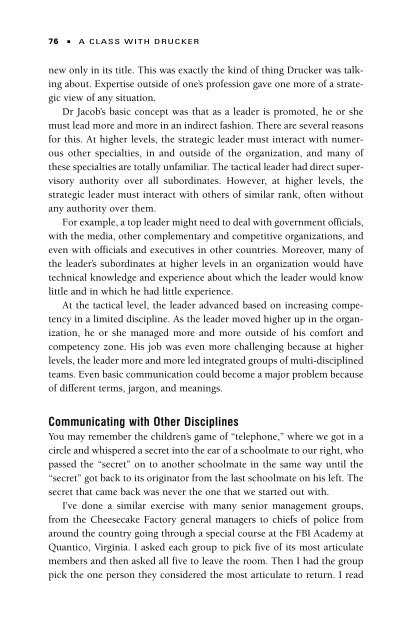A Class with Drucker - Headway | Work on yourself
A Class with Drucker - Headway | Work on yourself
A Class with Drucker - Headway | Work on yourself
You also want an ePaper? Increase the reach of your titles
YUMPU automatically turns print PDFs into web optimized ePapers that Google loves.
76 ■ A CLASS WITH DRUCKER<br />
new <strong>on</strong>ly in its title. This was exactly the kind of thing <str<strong>on</strong>g>Drucker</str<strong>on</strong>g> was talking<br />
about. Expertise outside of <strong>on</strong>e’s professi<strong>on</strong> gave <strong>on</strong>e more of a strategic<br />
view of any situati<strong>on</strong>.<br />
Dr Jacob’s basic c<strong>on</strong>cept was that as a leader is promoted, he or she<br />
must lead more and more in an indirect fashi<strong>on</strong>. There are several reas<strong>on</strong>s<br />
for this. At higher levels, the strategic leader must interact <str<strong>on</strong>g>with</str<strong>on</strong>g> numerous<br />
other specialties, in and outside of the organizati<strong>on</strong>, and many of<br />
these specialties are totally unfamiliar. The tactical leader had direct supervisory<br />
authority over all subordinates. However, at higher levels, the<br />
strategic leader must interact <str<strong>on</strong>g>with</str<strong>on</strong>g> others of similar rank, often <str<strong>on</strong>g>with</str<strong>on</strong>g>out<br />
any authority over them.<br />
For example, a top leader might need to deal <str<strong>on</strong>g>with</str<strong>on</strong>g> government officials,<br />
<str<strong>on</strong>g>with</str<strong>on</strong>g> the media, other complementary and competitive organizati<strong>on</strong>s, and<br />
even <str<strong>on</strong>g>with</str<strong>on</strong>g> officials and executives in other countries. Moreover, many of<br />
the leader’s subordinates at higher levels in an organizati<strong>on</strong> would have<br />
technical knowledge and experience about which the leader would know<br />
little and in which he had little experience.<br />
At the tactical level, the leader advanced based <strong>on</strong> increasing competency<br />
in a limited discipline. As the leader moved higher up in the organizati<strong>on</strong>,<br />
he or she managed more and more outside of his comfort and<br />
competency z<strong>on</strong>e. His job was even more challenging because at higher<br />
levels, the leader more and more led integrated groups of multi-disciplined<br />
teams. Even basic communicati<strong>on</strong> could become a major problem because<br />
of different terms, jarg<strong>on</strong>, and meanings.<br />
Communicating <str<strong>on</strong>g>with</str<strong>on</strong>g> Other Disciplines<br />
You may remember the children’s game of “teleph<strong>on</strong>e,” where we got in a<br />
circle and whispered a secret into the ear of a schoolmate to our right, who<br />
passed the “secret” <strong>on</strong> to another schoolmate in the same way until the<br />
“secret” got back to its originator from the last schoolmate <strong>on</strong> his left. The<br />
secret that came back was never the <strong>on</strong>e that we started out <str<strong>on</strong>g>with</str<strong>on</strong>g>.<br />
I’ve d<strong>on</strong>e a similar exercise <str<strong>on</strong>g>with</str<strong>on</strong>g> many senior management groups,<br />
from the Cheesecake Factory general managers to chiefs of police from<br />
around the country going through a special course at the FBI Academy at<br />
Quantico, Virginia. I asked each group to pick five of its most articulate<br />
members and then asked all five to leave the room. Then I had the group<br />
pick the <strong>on</strong>e pers<strong>on</strong> they c<strong>on</strong>sidered the most articulate to return. I read


